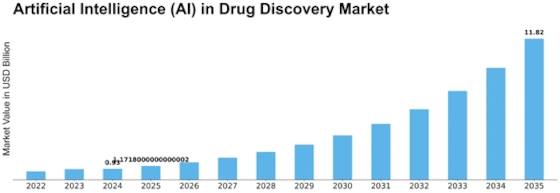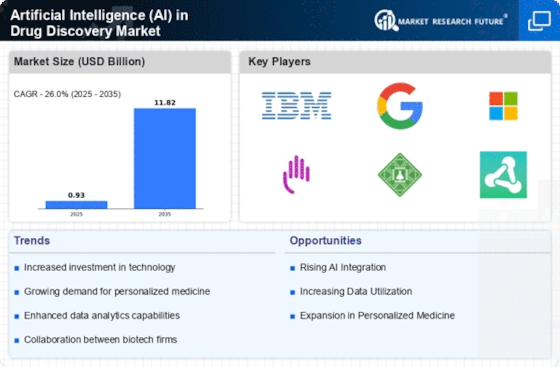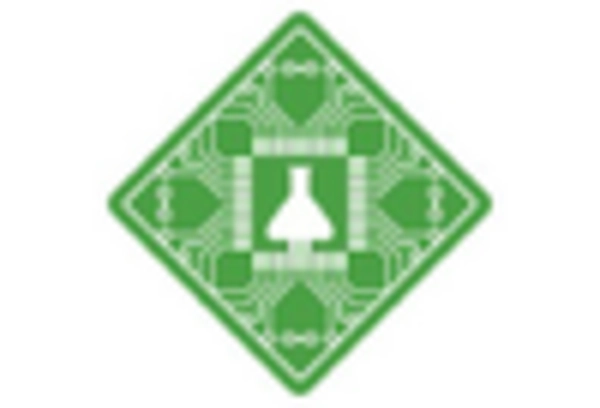Machine Learning
Natural Language Processing
Expert Systems
Deep Learning
Drug Repurposing
Clinical Trial Patient Recruitment
Drug Discovery
Preclinical Research
Pharmaceutical Companies
Biotechnology Companies
Research Institutions
Contract Research Organizations
Cloud-based
On-premise
North America
Europe
South America
Asia Pacific
Middle East and Africa
North America Outlook (USD Billion, 2019-2032)
AI Drug Discovery Market by Technology Type
Machine Learning
Natural Language Processing
Expert Systems
Deep Learning
AI Drug Discovery Market by Application Type
Drug Repurposing
Clinical Trial Patient Recruitment
Drug Discovery
Preclinical Research
AI Drug Discovery Market by End Use Type
Pharmaceutical Companies
Biotechnology Companies
Research Institutions
Contract Research Organizations
AI Drug Discovery Market by Deployment Type
Cloud-based
On-premise
AI Drug Discovery Market by Regional Type
US
Canada
US Outlook (USD Billion, 2019-2032)
AI Drug Discovery Market by Technology Type
Machine Learning
Natural Language Processing
Expert Systems
Deep Learning
AI Drug Discovery Market by Application Type
Drug Repurposing
Clinical Trial Patient Recruitment
Drug Discovery
Preclinical Research
AI Drug Discovery Market by End Use Type
Pharmaceutical Companies
Biotechnology Companies
Research Institutions
Contract Research Organizations
AI Drug Discovery Market by Deployment Type
Cloud-based
On-premise
CANADA Outlook (USD Billion, 2019-2032)
AI Drug Discovery Market by Technology Type
Machine Learning
Natural Language Processing
Expert Systems
Deep Learning
AI Drug Discovery Market by Application Type
Drug Repurposing
Clinical Trial Patient Recruitment
Drug Discovery
Preclinical Research
AI Drug Discovery Market by End Use Type
Pharmaceutical Companies
Biotechnology Companies
Research Institutions
Contract Research Organizations
AI Drug Discovery Market by Deployment Type
Cloud-based
On-premise
Europe Outlook (USD Billion, 2019-2032)
AI Drug Discovery Market by Technology Type
Machine Learning
Natural Language Processing
Expert Systems
Deep Learning
AI Drug Discovery Market by Application Type
Drug Repurposing
Clinical Trial Patient Recruitment
Drug Discovery
Preclinical Research
AI Drug Discovery Market by End Use Type
Pharmaceutical Companies
Biotechnology Companies
Research Institutions
Contract Research Organizations
AI Drug Discovery Market by Deployment Type
Cloud-based
On-premise
AI Drug Discovery Market by Regional Type
Germany
UK
France
Russia
Italy
Spain
Rest of Europe
GERMANY Outlook (USD Billion, 2019-2032)
AI Drug Discovery Market by Technology Type
Machine Learning
Natural Language Processing
Expert Systems
Deep Learning
AI Drug Discovery Market by Application Type
Drug Repurposing
Clinical Trial Patient Recruitment
Drug Discovery
Preclinical Research
AI Drug Discovery Market by End Use Type
Pharmaceutical Companies
Biotechnology Companies
Research Institutions
Contract Research Organizations
AI Drug Discovery Market by Deployment Type
Cloud-based
On-premise
UK Outlook (USD Billion, 2019-2032)
AI Drug Discovery Market by Technology Type
Machine Learning
Natural Language Processing
Expert Systems
Deep Learning
AI Drug Discovery Market by Application Type
Drug Repurposing
Clinical Trial Patient Recruitment
Drug Discovery
Preclinical Research
AI Drug Discovery Market by End Use Type
Pharmaceutical Companies
Biotechnology Companies
Research Institutions
Contract Research Organizations
AI Drug Discovery Market by Deployment Type
Cloud-based
On-premise
FRANCE Outlook (USD Billion, 2019-2032)
AI Drug Discovery Market by Technology Type
Machine Learning
Natural Language Processing
Expert Systems
Deep Learning
AI Drug Discovery Market by Application Type
Drug Repurposing
Clinical Trial Patient Recruitment
Drug Discovery
Preclinical Research
AI Drug Discovery Market by End Use Type
Pharmaceutical Companies
Biotechnology Companies
Research Institutions
Contract Research Organizations
AI Drug Discovery Market by Deployment Type
Cloud-based
On-premise
RUSSIA Outlook (USD Billion, 2019-2032)
AI Drug Discovery Market by Technology Type
Machine Learning
Natural Language Processing
Expert Systems
Deep Learning
AI Drug Discovery Market by Application Type
Drug Repurposing
Clinical Trial Patient Recruitment
Drug Discovery
Preclinical Research
AI Drug Discovery Market by End Use Type
Pharmaceutical Companies
Biotechnology Companies
Research Institutions
Contract Research Organizations
AI Drug Discovery Market by Deployment Type
Cloud-based
On-premise
ITALY Outlook (USD Billion, 2019-2032)
AI Drug Discovery Market by Technology Type
Machine Learning
Natural Language Processing
Expert Systems
Deep Learning
AI Drug Discovery Market by Application Type
Drug Repurposing
Clinical Trial Patient Recruitment
Drug Discovery
Preclinical Research
AI Drug Discovery Market by End Use Type
Pharmaceutical Companies
Biotechnology Companies
Research Institutions
Contract Research Organizations
AI Drug Discovery Market by Deployment Type
Cloud-based
On-premise
SPAIN Outlook (USD Billion, 2019-2032)
AI Drug Discovery Market by Technology Type
Machine Learning
Natural Language Processing
Expert Systems
Deep Learning
AI Drug Discovery Market by Application Type
Drug Repurposing
Clinical Trial Patient Recruitment
Drug Discovery
Preclinical Research
AI Drug Discovery Market by End Use Type
Pharmaceutical Companies
Biotechnology Companies
Research Institutions
Contract Research Organizations
AI Drug Discovery Market by Deployment Type
Cloud-based
On-premise
REST OF EUROPE Outlook (USD Billion, 2019-2032)
AI Drug Discovery Market by Technology Type
Machine Learning
Natural Language Processing
Expert Systems
Deep Learning
AI Drug Discovery Market by Application Type
Drug Repurposing
Clinical Trial Patient Recruitment
Drug Discovery
Preclinical Research
AI Drug Discovery Market by End Use Type
Pharmaceutical Companies
Biotechnology Companies
Research Institutions
Contract Research Organizations
AI Drug Discovery Market by Deployment Type
Cloud-based
On-premise
APAC Outlook (USD Billion, 2019-2032)
AI Drug Discovery Market by Technology Type
Machine Learning
Natural Language Processing
Expert Systems
Deep Learning
AI Drug Discovery Market by Application Type
Drug Repurposing
Clinical Trial Patient Recruitment
Drug Discovery
Preclinical Research
AI Drug Discovery Market by End Use Type
Pharmaceutical Companies
Biotechnology Companies
Research Institutions
Contract Research Organizations
AI Drug Discovery Market by Deployment Type
Cloud-based
On-premise
AI Drug Discovery Market by Regional Type
China
India
Japan
South Korea
Malaysia
Thailand
Indonesia
Rest of APAC
CHINA Outlook (USD Billion, 2019-2032)
AI Drug Discovery Market by Technology Type
Machine Learning
Natural Language Processing
Expert Systems
Deep Learning
AI Drug Discovery Market by Application Type
Drug Repurposing
Clinical Trial Patient Recruitment
Drug Discovery
Preclinical Research
AI Drug Discovery Market by End Use Type
Pharmaceutical Companies
Biotechnology Companies
Research Institutions
Contract Research Organizations
AI Drug Discovery Market by Deployment Type
Cloud-based
On-premise
INDIA Outlook (USD Billion, 2019-2032)
AI Drug Discovery Market by Technology Type
Machine Learning
Natural Language Processing
Expert Systems
Deep Learning
AI Drug Discovery Market by Application Type
Drug Repurposing
Clinical Trial Patient Recruitment
Drug Discovery
Preclinical Research
AI Drug Discovery Market by End Use Type
Pharmaceutical Companies
Biotechnology Companies
Research Institutions
Contract Research Organizations
AI Drug Discovery Market by Deployment Type
Cloud-based
On-premise
JAPAN Outlook (USD Billion, 2019-2032)
AI Drug Discovery Market by Technology Type
Machine Learning
Natural Language Processing
Expert Systems
Deep Learning
AI Drug Discovery Market by Application Type
Drug Repurposing
Clinical Trial Patient Recruitment
Drug Discovery
Preclinical Research
AI Drug Discovery Market by End Use Type
Pharmaceutical Companies
Biotechnology Companies
Research Institutions
Contract Research Organizations
AI Drug Discovery Market by Deployment Type
Cloud-based
On-premise
SOUTH KOREA Outlook (USD Billion, 2019-2032)
AI Drug Discovery Market by Technology Type
Machine Learning
Natural Language Processing
Expert Systems
Deep Learning
AI Drug Discovery Market by Application Type
Drug Repurposing
Clinical Trial Patient Recruitment
Drug Discovery
Preclinical Research
AI Drug Discovery Market by End Use Type
Pharmaceutical Companies
Biotechnology Companies
Research Institutions
Contract Research Organizations
AI Drug Discovery Market by Deployment Type
Cloud-based
On-premise
MALAYSIA Outlook (USD Billion, 2019-2032)
AI Drug Discovery Market by Technology Type
Machine Learning
Natural Language Processing
Expert Systems
Deep Learning
AI Drug Discovery Market by Application Type
Drug Repurposing
Clinical Trial Patient Recruitment
Drug Discovery
Preclinical Research
AI Drug Discovery Market by End Use Type
Pharmaceutical Companies
Biotechnology Companies
Research Institutions
Contract Research Organizations
AI Drug Discovery Market by Deployment Type
Cloud-based
On-premise
THAILAND Outlook (USD Billion, 2019-2032)
AI Drug Discovery Market by Technology Type
Machine Learning
Natural Language Processing
Expert Systems
Deep Learning
AI Drug Discovery Market by Application Type
Drug Repurposing
Clinical Trial Patient Recruitment
Drug Discovery
Preclinical Research
AI Drug Discovery Market by End Use Type
Pharmaceutical Companies
Biotechnology Companies
Research Institutions
Contract Research Organizations
AI Drug Discovery Market by Deployment Type
Cloud-based
On-premise
INDONESIA Outlook (USD Billion, 2019-2032)
AI Drug Discovery Market by Technology Type
Machine Learning
Natural Language Processing
Expert Systems
Deep Learning
AI Drug Discovery Market by Application Type
Drug Repurposing
Clinical Trial Patient Recruitment
Drug Discovery
Preclinical Research
AI Drug Discovery Market by End Use Type
Pharmaceutical Companies
Biotechnology Companies
Research Institutions
Contract Research Organizations
AI Drug Discovery Market by Deployment Type
Cloud-based
On-premise
REST OF APAC Outlook (USD Billion, 2019-2032)
AI Drug Discovery Market by Technology Type
Machine Learning
Natural Language Processing
Expert Systems
Deep Learning
AI Drug Discovery Market by Application Type
Drug Repurposing
Clinical Trial Patient Recruitment
Drug Discovery
Preclinical Research
AI Drug Discovery Market by End Use Type
Pharmaceutical Companies
Biotechnology Companies
Research Institutions
Contract Research Organizations
AI Drug Discovery Market by Deployment Type
Cloud-based
On-premise
South America Outlook (USD Billion, 2019-2032)
AI Drug Discovery Market by Technology Type
Machine Learning
Natural Language Processing
Expert Systems
Deep Learning
AI Drug Discovery Market by Application Type
Drug Repurposing
Clinical Trial Patient Recruitment
Drug Discovery
Preclinical Research
AI Drug Discovery Market by End Use Type
Pharmaceutical Companies
Biotechnology Companies
Research Institutions
Contract Research Organizations
AI Drug Discovery Market by Deployment Type
Cloud-based
On-premise
AI Drug Discovery Market by Regional Type
Brazil
Mexico
Argentina
Rest of South America
BRAZIL Outlook (USD Billion, 2019-2032)
AI Drug Discovery Market by Technology Type
Machine Learning
Natural Language Processing
Expert Systems
Deep Learning
AI Drug Discovery Market by Application Type
Drug Repurposing
Clinical Trial Patient Recruitment
Drug Discovery
Preclinical Research
AI Drug Discovery Market by End Use Type
Pharmaceutical Companies
Biotechnology Companies
Research Institutions
Contract Research Organizations
AI Drug Discovery Market by Deployment Type
Cloud-based
On-premise
MEXICO Outlook (USD Billion, 2019-2032)
AI Drug Discovery Market by Technology Type
Machine Learning
Natural Language Processing
Expert Systems
Deep Learning
AI Drug Discovery Market by Application Type
Drug Repurposing
Clinical Trial Patient Recruitment
Drug Discovery
Preclinical Research
AI Drug Discovery Market by End Use Type
Pharmaceutical Companies
Biotechnology Companies
Research Institutions
Contract Research Organizations
AI Drug Discovery Market by Deployment Type
Cloud-based
On-premise
ARGENTINA Outlook (USD Billion, 2019-2032)
AI Drug Discovery Market by Technology Type
Machine Learning
Natural Language Processing
Expert Systems
Deep Learning
AI Drug Discovery Market by Application Type
Drug Repurposing
Clinical Trial Patient Recruitment
Drug Discovery
Preclinical Research
AI Drug Discovery Market by End Use Type
Pharmaceutical Companies
Biotechnology Companies
Research Institutions
Contract Research Organizations
AI Drug Discovery Market by Deployment Type
Cloud-based
On-premise
REST OF SOUTH AMERICA Outlook (USD Billion, 2019-2032)
AI Drug Discovery Market by Technology Type
Machine Learning
Natural Language Processing
Expert Systems
Deep Learning
AI Drug Discovery Market by Application Type
Drug Repurposing
Clinical Trial Patient Recruitment
Drug Discovery
Preclinical Research
AI Drug Discovery Market by End Use Type
Pharmaceutical Companies
Biotechnology Companies
Research Institutions
Contract Research Organizations
AI Drug Discovery Market by Deployment Type
Cloud-based
On-premise
MEA Outlook (USD Billion, 2019-2032)
AI Drug Discovery Market by Technology Type
Machine Learning
Natural Language Processing
Expert Systems
Deep Learning
AI Drug Discovery Market by Application Type
Drug Repurposing
Clinical Trial Patient Recruitment
Drug Discovery
Preclinical Research
AI Drug Discovery Market by End Use Type
Pharmaceutical Companies
Biotechnology Companies
Research Institutions
Contract Research Organizations
AI Drug Discovery Market by Deployment Type
Cloud-based
On-premise
AI Drug Discovery Market by Regional Type
GCC Countries
South Africa
Rest of MEA
GCC COUNTRIES Outlook (USD Billion, 2019-2032)
AI Drug Discovery Market by Technology Type
Machine Learning
Natural Language Processing
Expert Systems
Deep Learning
AI Drug Discovery Market by Application Type
Drug Repurposing
Clinical Trial Patient Recruitment
Drug Discovery
Preclinical Research
AI Drug Discovery Market by End Use Type
Pharmaceutical Companies
Biotechnology Companies
Research Institutions
Contract Research Organizations
AI Drug Discovery Market by Deployment Type
Cloud-based
On-premise
SOUTH AFRICA Outlook (USD Billion, 2019-2032)
AI Drug Discovery Market by Technology Type
Machine Learning
Natural Language Processing
Expert Systems
Deep Learning
AI Drug Discovery Market by Application Type
Drug Repurposing
Clinical Trial Patient Recruitment
Drug Discovery
Preclinical Research
AI Drug Discovery Market by End Use Type
Pharmaceutical Companies
Biotechnology Companies
Research Institutions
Contract Research Organizations
AI Drug Discovery Market by Deployment Type
Cloud-based
On-premise
REST OF MEA Outlook (USD Billion, 2019-2032)
AI Drug Discovery Market by Technology Type
Machine Learning
Natural Language Processing
Expert Systems
Deep Learning
AI Drug Discovery Market by Application Type
Drug Repurposing
Clinical Trial Patient Recruitment
Drug Discovery
Preclinical Research
AI Drug Discovery Market by End Use Type
Pharmaceutical Companies
Biotechnology Companies
Research Institutions
Contract Research Organizations
AI Drug Discovery Market by Deployment Type
Cloud-based
On-premise




















Leave a Comment